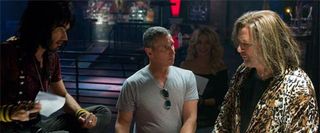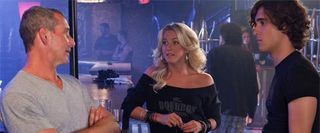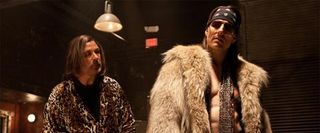Adam Shankman Talks Dealing With A Wild Baboon While Making Rock Of Ages

The actor W.C. Fields was once quoted as saying, “Never work with animals or children,” and it’s not exactly hard to figure out why. With both you are introducing elements that can never be predicted, and given how insane film sets typically are unpredictability is not a very good thing. So imagine how director Adam Shankman must have felt when a wild baboon starting going nuts while he was trying to make Rock of Ages.
I was recently invited to participate in a roundtable interview with Shankman to discuss the upcoming musical. Check out our conversation below in which Shankman discusses not only the literal on-set monkey shines, but also the madness and freedom of the 80s, choosing Diego Boneta as his star, and how John Waters served as his inspiration.
This movie seemed like a great deal to put together.
It was. It was actually scary because you had to do the A Beautiful Mind thing, because you’re tracking all these [pretends to trace pins with pieces of string]… with Hairspray there was a nice little train that you got on, this was like tracking all these different stories with less time than I had on Hairspray and the exact same amount of money. Basically everything in this movie is made of paste and papier-mâché.
How did you manage to put this all together and bring it from the stage to the screen?
I think I went in with a very clear picture in my head of what I wanted to do, which started with writing kind of this love letter to all these things. My past, which literally happened right where we are sitting right now [the London Hotel in Los Angeles]. I grew up two miles down the street, my dad’s office was around the corner, he was a music business manager. I graduated in 1982, I lived in this world – I wasn’t a metal head, but this music was on MTV, every other video was “Hot For Teacher” or “Pour Some Sugar On Me” or “White Snake” or Ratt “Round N’ Round,” Twisted Sister…whether or not you had them in your Walkman they were everywhere. And the news was literally full of – I mean, I watched MTV News, that was my go-to news channel then [laughs] – and the news was full of the antics of these guys. And these were guys who could throw a couch out of a window of a hotel and it was a funny thing! It wasn’t like a bad thing.
So I wanted to make sure that I was honoring that and not making fun of that number one. Number two, I wanted to make sure that these people, because I want them supporting the movie and because this music is so entrenched in our lives that I honor that as well, and not make fun of them and that. The period makes fun of itself for god’s sake. You don’t have to go out and make fun of the period. It’s its own gimmick, a joke, so to speak. Shoulder pads! Come on! So there’s that, and I also had to honor my whole history in musical theater. So I just went in almost approaching it as a drama, but with a lot of authenticity, and knowing full well that it would be really, really funny and really crazy if I could actually pull it off. And two things made me know that I could pull it off and made me feel like I could pull it off. One, my production designer I haven’t seen in 35 years, but grew up in my neighborhood and his little brother was my best friend in elementary school, so he knew exactly what I was talking about when I was talking about imagery and Tower Records and this and that. There was no research that needed to be done.
CINEMABLEND NEWSLETTER
Your Daily Blend of Entertainment News
Tom Cruise is the first person who said to me, “Dude, when are we going to make a musical?” and he was laughing because Suri [Cruise]’s favorite movie was Hairspray, and I think he was sort of joking, and I was like, “Yeah, we got one coming down. Let’s make Damn Yankees!” And then when this opportunity came up I thought, “Oh my god, if I could get one of the biggest movie stars in the world to play one of the biggest rock stars in the world…and I’ll tell you what was his audition for this movie: it was Tropic Thunder. So knowing he could commit to a comedic character the way that he commits to a dramatic character. There’s no 100 percent with him, there’s only ten billion percent, so I knew if I was going to fly, it was going to fly. And I think he was so stunned by the fact that somebody actually had the balls to ask him to do this that he kind of had to take it seriously. And then we took him and he worked with a vocal coach and he was prepping Mission: Impossible, so he had a year back-and-forth about potentially doing this and then he finished and the vocal coach was like, “He’s insane. He’s got this huge voice,” and I heard and I was there with a glass on the door. He said, “Let’s do this,” and the second he came in the rest of the cast was like [makes sounds people rushing in], except for Diego. But the first person I wanted in the movie was Mary J. [Blige]. So that’s where I started vocally. And then it was about putting in the right two kids.

Why did you choose to start with Mary J. Blige?
Because I wanted Mary J. Blige [laughs]. She’s Mary J. Blige.
And in the musical that character is usually the best singer.
Yeah, the fabulous African American woman who knows everything about everything. And Queen Latifah had done it twice, so it was someone else’s turn.
I had the pleasure of visiting you on the set and you spoke with us for 45 minutes, you were very gracious, but you never mentioned that there was a monkey in this movie. Why did you keep the monkey a secret? What was the motivation for having the monkey in the movie, and how did Tom Cruise enjoy his time with the monkey?
He enjoyed working with Mickey, is the monkey’s name. He enjoyed Mickey immensely. Mickey was very sensitive and very, very sweet. It came from Bubbles, Michael Jackson’s Bubbles. And we were talking about Michael Jackson and Bubbles because there’s nothing in this movie that didn’t happen, basically. I know it seems weird, but it’s all real. And Tom basically said, “I want a friend,” and I said, “Okay,” and Justin [Theroux] said, “Let’s get you a monkey,” and then I was like, “Well, The Hangover II has that capuchin, so I guess it’s a baboon.” And then Tom was like, “And I think his name is Hey Man.” And I was like, “Stay calm, whatever you want.” Yeah, it was Tom who came up with the name. So he kept saying “Hey Man” and maybe it was Justin who said, “And maybe that’s his name,” and I was like “That’s awesome!”
Was it difficult training a monkey?
No! They’re very well trained beforehand and they have the script and they know what they have to do.
I heard he got loose.
Oh, well, when the trainers are saying, “Nobody grab him, he’ll kill you…” He was actually playing. It was 4:30 in the morning, there’s a thousand extras in the street, it was like 110 degrees – I’m not kidding – and he got loose, and it was just him loping around screaming [imitates very loud monkey scream], with those giant canines showing. And there were five trainers chasing him going, “He’s fucking with you! Don’t touch him!” And I turned to the producer and I was like, “You’ve got to be kidding. I do not need this shit right now.” So that’s movie making.

What did you see in Diego Boneta?
The only way I can give you a comparison is when I found Nikki Blonsky in Hairspray. I knew that I wanted somebody fresh with no baggage, who knew who they were. I had no idea that he was a star in Mexico and Brazil and all that because I don’t hang out there! I didn’t know! I was on a website and I got to his audition and I’m clicking through, and at first I was like, “Oh my god, that face!” And then I went, “Oh my god, that hair! I wouldn’t have to wig him!” That was really my first thing. And then he acted and, you know, Julianne [Hough] and Diego are absolutely the unsung heroes in this movie, or sung heroes I guess, because they didn’t have any of the character eccentricities to fall back on. They actually had to act normal in this world, and it’s a really weird world, so the balancing act of doing that and actually selling what they had to sell against all those actors was nothing short of miraculous. No one realizes just how hard that balancing act was, but with Diego…I’m not going to lie, there’s some clunky dialogue in there by just trying to be normal in the world. And the exposition about his dreams and all that kind of stuff, and he made it all sound so okay. And then when he sang it was a pop sound, but it was a fabulous voice. So with Julianne we had to sign her up for rock star college, kick the country out of her; with him we had to kick the pop star out of him, and teach them how to move. And the period it was really fun to educate them on – we just watched tons of videos and we even watched Valley Girl a hundred times. I mean, it was a blast. And they were just so excited and open, and they were the only ones who were there the whole time. They had to carry the whole movie, everybody just kept on kind of popping in and out.
When we spoke with Mary J. Blige earlier she mentioned that she was asked to see the musical, though she never did, but when we spoke to Diego he told us that you specifically told him not to see the movie. What was the motivation behind that approach?
Mary’s role is very, the one in the play is Justice in the play also plays a lot of other characters, so I didn’t want her to kind of confuse what that was. And the specific Justice stuff is pretty the same in the play. Drew, in the movie, is not as withdrawn and shy as the Drew in the play. So I didn’t want Diego to think that’s what I wanted him to do.

When you’re adapting a musical, particularly one that was such a big hit or is such a big hit, and you bring it to the big screen, how do you decide what to change, what to keep, what to cross out…
Honestly, it came with the courage to do it at all came from John Waters when I got Hairspray and John… I emailed John, I got his email address, and I said, “Dear Mr. Waters, my name is Adam Shankman, I was just invited to direct the musical of Hairspray, hope you don’t mind, love Adam.” And I was in Baltimore making the first Step Up at the time and he immediately emailed me back saying, “So where are you?” and I said, “I’m in Baltimore,” and he said, “So am I! Let’s have lunch.” So we had lunch, and we had never been in Baltimore before so it was kind of a strange kismet, but immediately he said to me, “Do not do what I did, do not do what the play did, you can only do what you do. You have to tell the story through your own filter otherwise it will be a disaster. If you try to pander to who you think the other audiences are,” and he said, “You can change anything as long as you make a good movie. Everyone will forgive you as long as you make a good movie. Because, you know, fans are going to be fans.” Weirdly, for my limited career I’ve made a lot of adaptations, so with this one, in kind of crafting it for the screen, I just had to go with how I thought that the story was told most honestly. In the play Sherrie sleeps with Stacee Jaxx, which, in the movie, would be unforgivable. You could never root for that relationship again. Stacee then gets her fired for no apparent reason. Things happen in the play, literally she gets fired so that she can sing “Harden My Heart.” You know what I mean? I had to give more, and it works fabulously in the play because they have a narrator and it’s super fun and kitschy and I just needed audiences to hook into my characters more emotionally. So that’s kind of where I started, and then I needed to cut at least 30 minutes out in order for it to be proper length for an audience.
Why do you think younger people who aren’t as familiar with the music go see Rock of Ages?
Because it’s a party! It’s fun and for boys there’s a lot of naked girls and for girls there’s a lot of romance. The whole movie, ultimately, is about people searching for what they think is something, but what they’re really looking for is love. And none of the excess or any of that means a damn unless you have a grounded place to start from, which is love. So it’s a sweet, weird morality story in a weird way, that has the fun of that period, and that period was the last time that this freaking country was innocent. You could have all the sex you want, there was no AIDS, you could do all the drugs you want, there was no rehab. You could throw TVs out of windows of hotels and people loved it, threw their hands up. And so it was a time without consequence so it’s just fun. It’s just a party.

Eric Eisenberg is the Assistant Managing Editor at CinemaBlend. After graduating Boston University and earning a bachelor’s degree in journalism, he took a part-time job as a staff writer for CinemaBlend, and after six months was offered the opportunity to move to Los Angeles and take on a newly created West Coast Editor position. Over a decade later, he's continuing to advance his interests and expertise. In addition to conducting filmmaker interviews and contributing to the news and feature content of the site, Eric also oversees the Movie Reviews section, writes the the weekend box office report (published Sundays), and is the site's resident Stephen King expert. He has two King-related columns.
Most Popular





